- issuing a vexatious litigant restrictive order ex parte without notice, just cause or an opportunity to oppose (NCJC 2.6(, NCJC 2.9 (improper ex parte communications are prohibited)
- denying unopposed motions by differential enforcement of the court rule (EDCR 2.20(e)) that allows a Movant to submit a proposed order for the court to grant an unopposed motion if no party filed a timely written opposition (NCJC 2.2 (apply the law fairly and impartially)
- declaring a non-party is a party (NCJC 2.2 (apply the law fairly and impartially) despite all evidence and law to the contrary
Judge Peterson showed bias against me by declaring I was a vexatious litigant in absentia, the rules don’t apply to my opponents, and Red Rock LLC was a party contrary to all law and evidence.
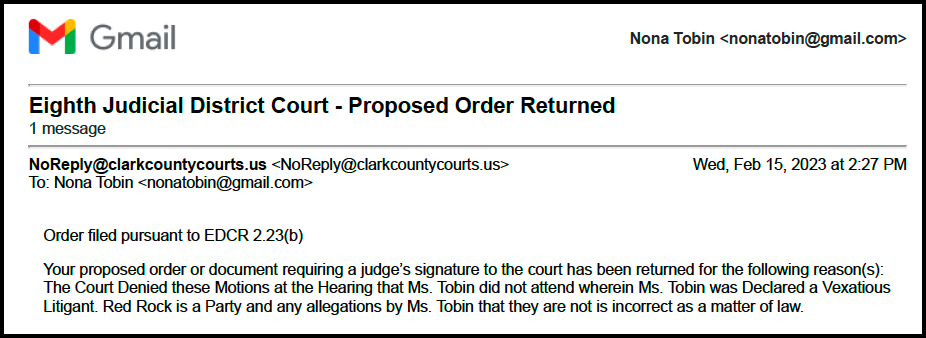
Here are the facts and law regarding Red Rock LLC’s lack of standing to be a party.
The court record shows Red Rock LLC was not a party.
This information was all provided to the court on 1/23/23 in my motion to reconsider and my motion to strike all rogue filings of non-party Red Rock LLC. (Doc # 120). These motions were scheduled to be heard on 2/28/23 (CNOH Doc #121), but Judge Peterson ignored it, and declared at the 2/2/23 ex parte hearing that the motions were denied and that Nationstar and Red Rock who were present at the unnoticed hearing were exempt from EDCR 2.20(e).
Nevada case law is clear. This court lacks jurisdiction to grant judgment for or against non-party Red Rock LLC
I.C.A.N. Foods, Inc. v. Sheppard (In re Aboud Inter Vivos Trust), 314 P.3d 941, 946 (Nev. 2013) (“Young v. Nev. Title Co., 103 Nev. 436, 442, 744 P.2d 902, 905 (1987) (“A court does not have jurisdiction to enter judgment for or against one who is not a party to the action.””)
To be the Plaintiff, you have to file the complaint.
Moore v. Univ. Med. Ctr. of S. Nev., No. 69367, at *2 (Nev. App. Jan. 13, 2017) (“The district court clearly erred by failing to apply the Nevada Revised Statutes, the Nevada Rules of Civil Procedure, and applicable precedent from our supreme court, and by entering judgment without a trial in favor of a party that never even pled a claim for relief”)
Red Rock Financial Services, a partnership, not LLC, filed the complaint. Red Rock LLC did not file any claims and is not the Plaintiff.
The Plaintiff Red Rock (sometimes “RRFS”), with an interest in the proceedings, was Sun City Anthem’s former managing agent, FSR dba Red Rock Financial Services (EIN 88-0358132). FSR (formerly known as RMI Management LLC) dba Red Rock held the NRS 649 debt collection license, performed debt cllection services for SCA under a contract for the applicable time period executed onthat was terminated by SCA on 4/26/15. conducted the wrongful foreclosure of my late fiance’s home in 2014 and wrongfully failed to distribute to her the excess proceeds from the sale, did not file any response to my motion.
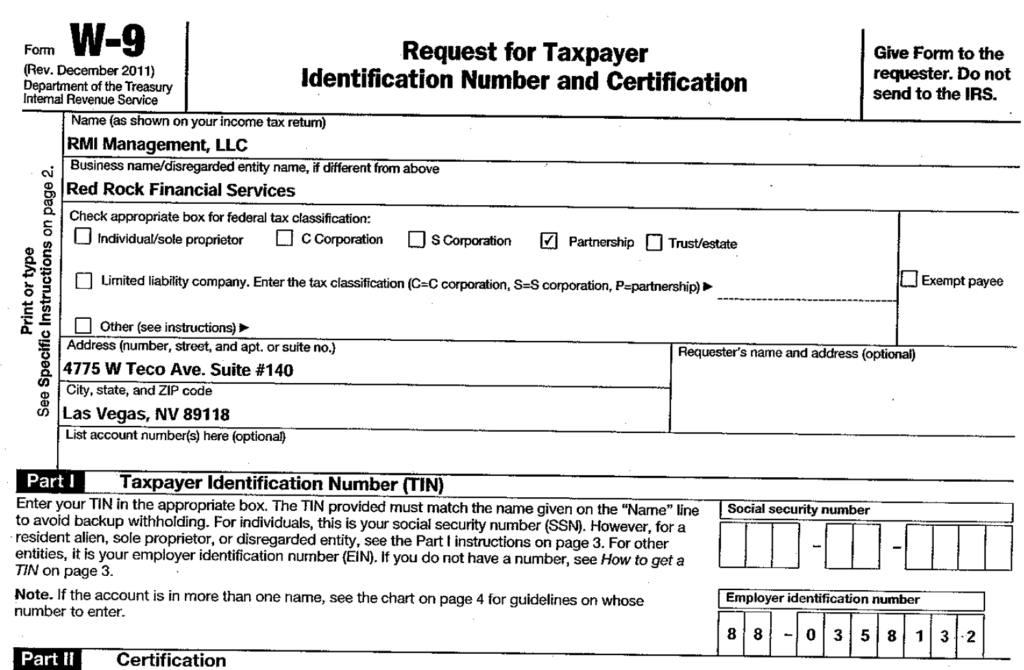
The Plaintiff is identified on Doc # 2 the Complaint.
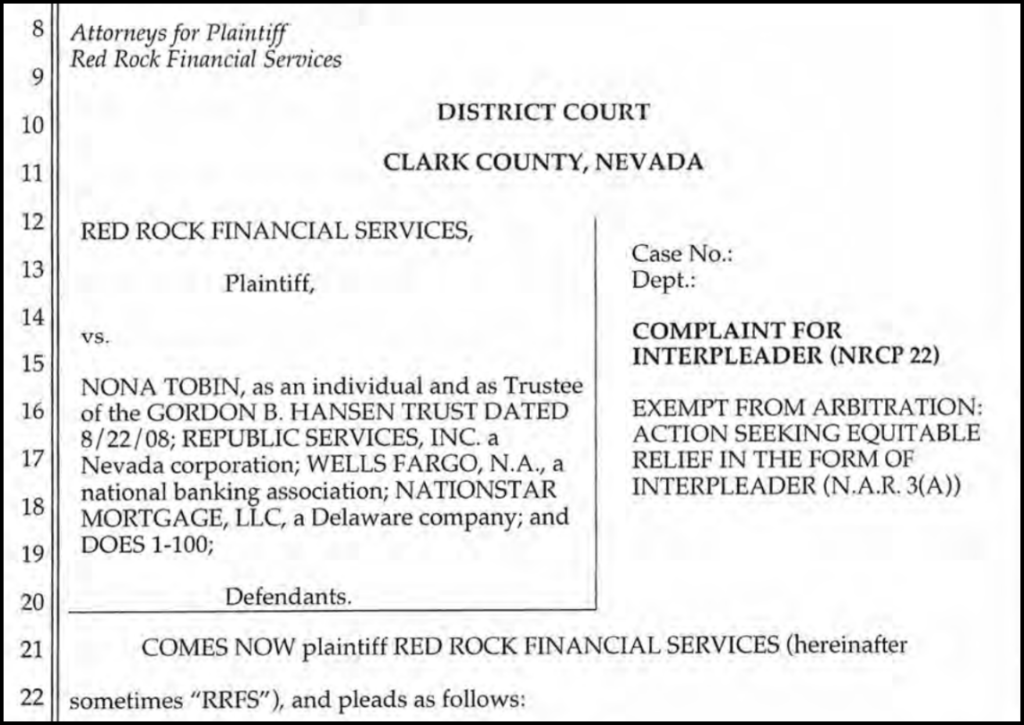
NRCP 10(a) requires all parties to be named in the original complaint.
Rule 10. Form of Pleadings
(a) Caption; Names of Parties. Every pleading must have a caption with the court’s name, the county, a title, a case number, anda Rule 7(a) designation. The caption of the complaint must name all the parties; the caption of other pleadings, after naming the first party on each side, may refer generally to other parties.
NRCP 10(a)
The Initial Appearance Fee Disclosure also identifies who an attorney is representing in a case. The Plaintiff is not Red Rock LLC.
Although both Plaintiff Red Rock and non-party Red Rock LLC are Steven Scow’s clients, he didn’t claim to be representing both of them in this case until he decided to start filing into the case for unknown reasons on behalf of the non-party. Doc No. 1 is Scow’s IAFD for Red Rock, with no Red Rock LLC in sight.
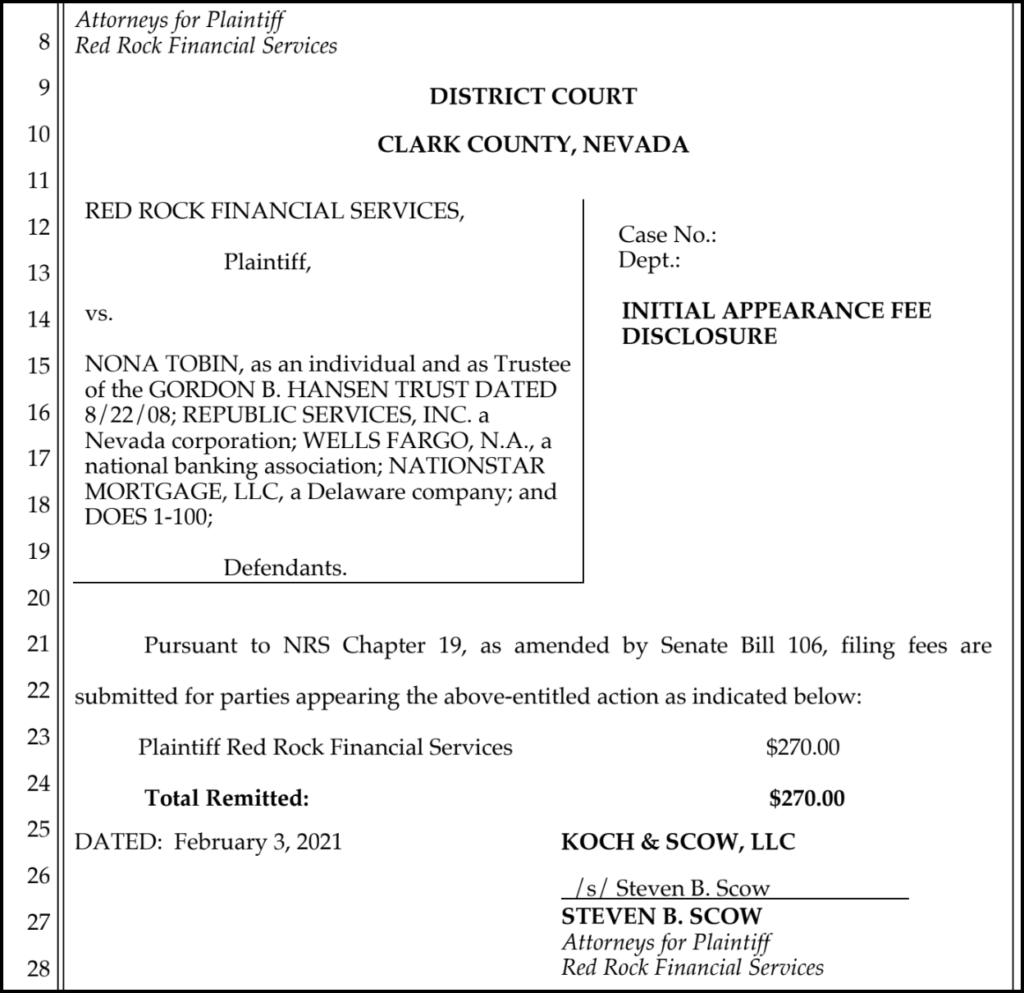
To be a Defendant you have to have received proper service of process
Levin v. Second Judicial Dist. Court of Nevada, No. 63941, at *6 (Nev. Sep. 11, 2017) (“Service of process is required before a court can exercise personal jurisdiction over a person or entity. C.H.A. Venture v. G.C. Wallace Consulting Eng’rs, Inc., 106 Nev. 381, 384, 794 P.2d 707, 709 (1990) (“Personal service or a legally provided substitute must still occur in order to obtain jurisdiction over a party.”). Moreover, “[a] district court is empowered to render a judgment either for or against a person or entity only if it has jurisdiction over the parties and the subject matter,” and a district court cannot exercise personal jurisdiction over a party—even one with actual notice of the proceedings—unless that party has first been adequately served. Id. at 383-84, 794 P.2d at 708-09 (emphasis added)”)
The facts in the court record show that Red Rock LLC was never served any claims against it. Therefore, it is not a defendant.
The only summons served in case A-21-828840-C were Doc No. 8 (Republic Services), Doc No. 9 (Wells Fargo), Doc No. 10 (Nona Tobin as an individual), Doc No. 11 (Nona Tobin as the trustee of the Gordon B. Hansen Trust, dated 8/22/08), Doc No. 12 (Nationstar Mortgage LLC).
Red Rock LLC is not a Cross-Defendant as no party filed any claims against it.
I’m the only party who filed any cross-claims, and I certainly didnt file any claims against Red Rock LLC. Therefore, Red Rock LLC is not a cross defendant.
To intervene, you have to show you have an interest in the proceedings. Red Rock LLC had no interest.
Non-party Red Rock LLC did not file a motion to interveneTo intervene, NRCP 24 requires a timely motion and an interest in the subject non-party Red Rock LLC does not have. Non-party Red Rock LLC did not file a motion to intervene
Non-party Red Rock LLC has no interest in the subject of the proceedings.
Non-party Red Rock LLC did not ever have any contractual relationship with the HOA, Sun City Anthem, under whose statutory authority the HOA sale was conducted. Non-party Red Rock LLC did not conduct the 8/15/14 foreclosure sale of 2763 White Sage.
Non-party Red Rock LLC did not ever possess, hold in trust, or have any interest in, the $57,282.32 excess proceeds that Plaintiff/Counter-defendant/HOA Sale Trustee Red Rock failed to distribute after the 8/15/14 sale.
Non-party Red Rock LLC is not the entity that disregarded the NRS 116.31164(3)(c) (2013) mandate to distribute all the proceeds after the sale in 2014 in the manner proscribed by that clear and unambiguous controlling statute.
Non-party Red Rock LLC is not the entity that is still unlawfully withholding the $57,282.32 excess proceeds from sole claimant Tobin, 8+ years after the sale, pending action by this court.
Therefore, non-party Red Rock LLC never timely filed the required NRCP 24(a)(2) motion to intervene. It could not assert it had an interest it did not have:
“an interest relating to the property or transaction that is the subject of the action, and is so situated that disposing of the action may as a practical matter impair or impede the movant’s ability to protect its interest, unless existing parties adequately represent that interest.”
NRCP 24(a)(2)
Further, there is no provision in NRCP 24 for a court to sua sponte allow a non-party to intervene when there has been no motion to intervene wherein the non-party claimed it had an interest that could not otherwise be protected. NRCP 24 requires a timely motion to initiate intervention. NRCP 24 does not give a court sua sponte authority to turn an entity that did not file and serve the complaint into the Plaintiff. NRCP 24 does not give a court sua sponte authority to turn an entity against whom no claims were filed or served into a Counter-defendant.
It is outside the court’s jurisdiction court to decide for or against a non-party.
Young v. Nevada Title Co., 103 Nev. 436, 442 (Nev. 1987)
“The district court was without the power to retain jurisdiction over non-parties because it never had such jurisdiction in the first place. A court does not have jurisdiction to enter judgment for or against one who is not a party to the action. Quine v. Godwin, 646 P.2d 294, 298(Ariz.Ct.App. 1982); Fazzi v. Peters, 440 P.2d 242, 245(Cal. 1968). Accordingly, it is clear the district court erred in entering judgment in favor of non-parties.”)
Moore v. Univ. Med. Ctr. of S. Nev., No. 69367, at *3 n.2 (Nev. App. Jan. 13, 2017) (“Booke was not a party to the case, and the court therefore lacked jurisdiction to enter any judgment against him. See NRCP 4(d); Schwob v. Hemsath, 98 Nev. 293, 294, 646 P.2d 1212, 1212 (1982) (“Without proper service of process the district court acquires no. jurisdiction over a party.”) (citing Brockbank v. District Court, 65 Nev. 781, 201 P.2d 299 (1948); State v. District Court, 51 Nev. 206, 273 P. 659 (1929)). ”)
Steven Scow’s misrepresentation caused Judge Peterson to unwittingly act outside her jurisdiction to grant non-party Red Rock LLC’s 4/16/21 motion to dismiss.
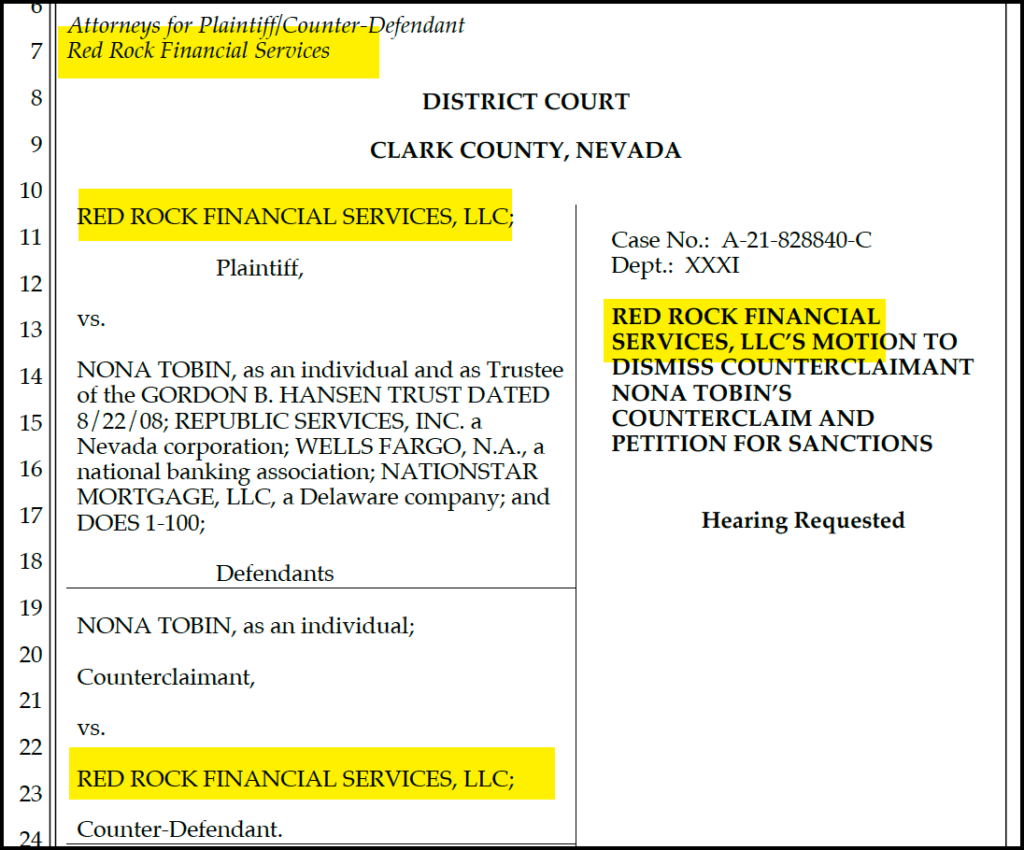
Possibly Steven Scow was concealing that his client Plaintiff Red Rock also didn’t have standing to file the interpleader complaint either, but I’ll leave that for another blog.
To have standing to file an interpleader action,